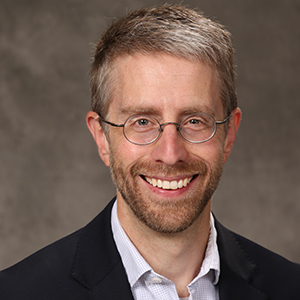Philosophy
Quick Links:
- Imagination and Experience: Conscience and Moral Reflection in Ignatian Pedagogy
- Ignatian Pedagogy in Philosophy: Finding Moments for Reflection
- The Life of Saint Ignatius: Philosophical and Pedagogical Implications
- The Political Character of Ancient Greek Religion
- The Jesuit Understanding of a Liberal Arts Education
Imagination and Experience: Conscience and Moral Reflection in Ignatian Pedagogy
Dr. Timothy Brownlee, Ph.D.
Mentor: Dr. Trudelle Thomas, Ph.D. (English)
General Aims
My general aim for this project was to investigate the ways in which Ignatian pedagogy and practice can contribute to the development of a habit of moral reflection in our students. Since I regularly teach PHIL100 Ethics as Intro to Philosophy, I was particularly interested in the ways in which I might draw on the tradition of Jesuit pedagogy to help students to identify connections between the theories of justice and of the good life that we examine in that course and their own experiences. My initial aim was to consider possible roles for the Spiritual Exercises in establishing that link.
Read full text of "Imagination and Experience: Conscience and Moral Reflection in Ignatian Pedagogy"
Ignatian Pedagogy in Philosophy: Finding Moments for Reflection
Elliott D. Chen, Ph.D.
Mentor: Renea Frey, Ph.D. (English)
Introduction
With this project, I've tried to better understand what reflection means as a Jesuit practice and to find ways of incorporating such reflective practices into my own teaching in the philosophy core. My hope is that this will be pedagogically effective, draw out a kinship between the aims of philosophy and Xavier’s mission and identity, and help students cultivate a lifelong habit of reflection.
Read full text of "Ignatian Pedagogy in Philosophy: Finding Moments for Reflection"
The Life of Saint Ignatius: Philosophical and Pedagogical Implications
Dr. David Rodick, Ph.D.
Mentor: Rachel Chrastil, Ph.D. (History)
Introduction
I have always been interested in the experiential context out of which one philosophizes. In keeping with this interest, I wanted to obtain some sense of the experiential context out of which Iñigo de Loyola emerged to become Saint Ignatius. I began W.W. Meissner's Ignatius of Loyola: The Psychology of a Saint,[1] and moved to the Spiritual Diary and Spiritual Exercises, as well as other cognate works in Ignatian scholarship. Below are some insights discerned along the way, followed by some brief implications for pedagogy.
Read full text of "The Life of Saint Ignatius: Philosophical and Pedagogical Implications"
The Political Character of Ancient Greek Religion
Eleni Tsalla, Ph.D.
Mentor: Arthur Dewey, Ph.D. (Department of Theology)
Course Information
The ethics course (PHIL 100) is designed to familiarize the students with methodical attempts to answer the question what it means to lead a good human life on the basis of Plato's Republic, which is the requisite text.
The ancient political philosophy (PHIL 362) course is a survey of ancient political thought with an emphasis on Plato's and Aristotle's political writings.
We touch upon religion in both courses. From a modern perspective, the ancient philosophical approach to religion is very distinctive. Both Plato and Aristotle understand politics as the architectonic art that oversees, along with everything else, religious institutions to ensure that their effects coincide with those of legislation.
Read full text of "The Political Character of Ancient Greek Religion"
The Jesuit Understanding of a Liberal Arts Education
Dr. James Wood, Ph.D.
Mentor: Dr. Kathleen Smythe, Ph.D. (Philosophy)
In the course of my initial exploration of various approaches to this program, primarily through reading the reports of past participants, I saw that most projects in the Ignatian Mentoring Program have focused on methodology, broadly speaking--for example, by applying the Ignatian spiritual principles of discernment and reflection to classroom teaching. After consulting with my mentor, Kathleen Smythe, I decided to investigate another aspect of Jesuit education, namely its content rather than its methodology.[1] Specifically, I was interested in the conception of liberal education that guided the early Jesuits and their successors in their selection and organization of subjects, texts, and authors. In this way I hoped that I might come to a greater understanding of the principles and traditions that have helped to shape and that continue to guide Xavier as "a Jesuit Catholic university rooted in the liberal arts tradition."[2] In what follows I will briefly summarize the results of my research and then reflect on their implications.
Read full text of "The Jesuit Understanding of a Liberal Arts Education"
Back to Top
To provide feedback, please email: jesuitresource@xavier.edu
Jesuitresource.org is developed by The Center for Mission and Identity at Xavier University with support from the Conway Institute for Jesuit Education. Learn more about Jesuit Resource.
